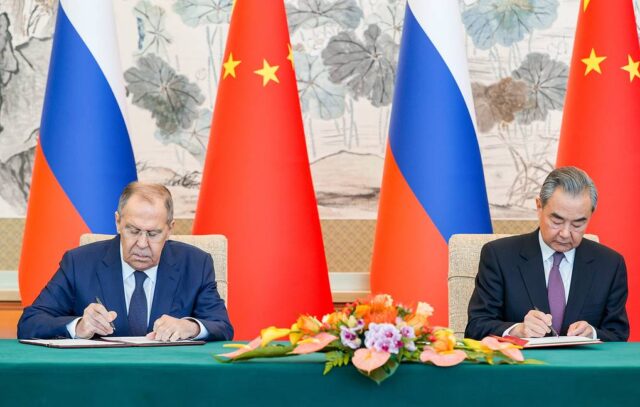
Russia Kowtows to China
Publication: Eurasia Daily Monitor Volume: 21 Issue: 59
By:

Executive Summary:
- Russian Foreign Minister Sergei Lavrov made an official visit to China earlier this month to meet with Chinese President Xi Jin Ping and Foreign Ministry, laying the foundation for future cooperation.
- Lavrov underscored that Russia’s priority is to strengthen and consolidate relations with China, indicating Moscow’s growing submission to Beijing.
- The Russian pivot to Asia was buried some time ago when the Kremlin’s policies began transforming Russia into an “economic colony” of China.
On April 8, Russian Foreign Minister Sergei Lavrov arrived in China for an official visit (Russian Ministry of Foreign Affairs (MID), April 9). Foreign ministers’ visits abroad are often a necessary precedent in laying the foundation for bilateral and multilateral summits. Lavrov’s trip was no different (TASS, April 8). The Russian official’s pronouncements in Beijing seemingly acknowledged what many observers, including French President Emmanuel Macron, have pointed to—namely, Russia developing into China’s “vassal” and “economic colony” (see EDM, February 6, May 24, August 1, December 5, 2023, January 23, February 8; The Moscow Times, May 15, 2023; Carnegie Politika, June 7, 2023; MID, April 9). While the visit was meant to signal a strengthening of bilateral ties, in many ways, it all but confirmed these warnings.
Lavrov initially voiced a newfound support for Chinese Communist Party General Secretary Xi Jinping’s 12-point peace plan for Ukraine. Beijing issued the plan in 2023, which Moscow politely rejected at the time because the conditions at the front were not in Russia’s favor (The Moscow Times, February 27, 2023). Lavrov, however, now states that Xi’s plan is the most honest and reasonable approach presented thus far (RIA Novosti, April 4). This policy reversal, the latest in a long line since Russian President Vladimir Putin’s 2012 return to the presidency, likely stems from the large-scale economic and military assistance Beijing renders to Moscow but does not discuss publicly.
An even more telling sign of subordination can be found in Lavrov’s direct remarks to Xi. The Russian official not only fulsomely praised Xi but also fawned over China’s achievements, all while indicating Moscow’s loyalty to Beijing. Lavrov declared, “We would like to express the highest assessment and admiration for the successes you have achieved over these years and, in particular, over the past decade under your leadership.” Additionally, he emphasized, “These successes make us happy because they are the successes of our friends, though not everyone shares this attitude and tries to contain China’s development. The same is done regarding Russia’s development” (TASS; MID, April 9). This language fully evokes the kind of “comradely greeting” Soviet satraps would use in Eastern Europe when they would come to the Kremlin during the Cold War for official talks.
Lavrov went on to establish that Russia’s priority is to “comprehensively consolidate and upgrade relations with China,” further underscoring Moscow’s growing submission to Beijing. Russia is willing “to earnestly implement” Xi and Putin’s joint consensus to strengthen mutual coordination and work with the other countries in the Global South to bring about a new world order. Xi responded by highlighting how seriously China takes its ties with Russia. He stressed that the two countries will show more responsibility (a possible swipe at Russian irresponsibility in starting the war in Ukraine) and unite the Global South in the quest for a more equal and just international order (The State Council of the People’s Republic of China, April 9).
The two countries’ foreign ministers also discussed China’s call for more coordination in the Asia-Pacific against United States and its allies. Beijing is likely feeling the heat from Washington and sees its coordination with Moscow in the region as insufficient (MID, April 9). A closer examination of the Kremlin’s interests, however, casts doubt on improving cooperation. Russia’s ties to Japan are nonexistent, primarily due to Russia’s refusal to negotiate over the Kuril Islands, fear of Tokyo’s alliance with the Washington, and Sino-Japanese animosity (The Moscow Times, January 30). Russian ties to South Korea are equally futile given the Russo–North Korean entente whereby Pyongyang transfers weapons to Moscow for use in Ukraine in return for Russian technical support and help with its satellites (see EDM, August 1, 2023; Globalaffairs.ru, January 22).
Moscow’s allegiance to Beijing has virtually buried its pivot to Asia (see EDM, November 3, 2023). Its demise began some time ago, and the Kremlin is now paying the price. For example, Russia now sells 80 percent of its oil for rubles and yuan, cementing its growing dependence on China for vital economic inputs (TASS, March 21). This figure conforms to other indicators in the Russian economy, further corroborating the risk of Russia fully becoming China’s economic colony (see EDM, February 6, 2023; January 23; Telegram.me/centralbank_russia, February 8; Central Bank of Russia, accessed April 16).
Russia began its pivot to Asia to generate support for economic development in Siberia and the Far East. The idea was that sound economic policy and diplomacy would generate a virtuous circle of increased development and enhanced security. The results, however, have not come close to these initially optimistic goals. The final irony here invokes Hegel’s “cunning of reason.” Russia went to war against Ukraine to proclaim its great-power status and unbridled sovereignty over the surrounding regions. Instead, this endeavor has resulted in Russia becoming the subordinate partner in its alliance with China. Lavrov’s visit confirms that, far from being a great power, Russia is increasingly transforming into China’s vassal.



